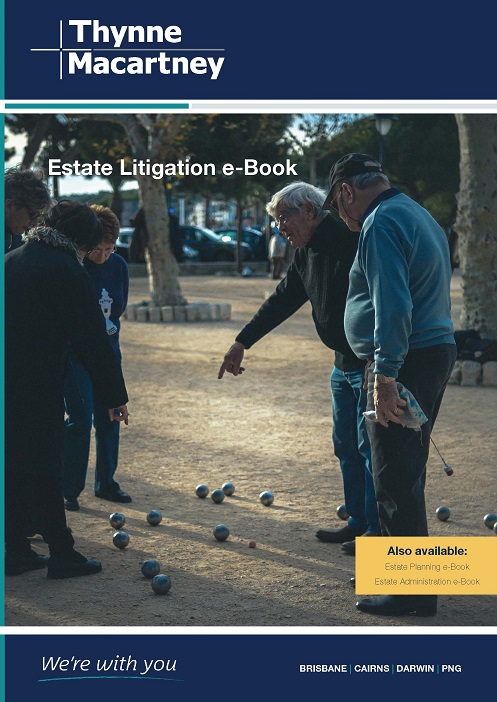Estate litigation, Family Provision Applications and dispute resolution.
Unfortunately, things do not always run smoothly when it comes to Wills and deceased estates. Disputes sometimes arise and must be resolved before the administration of the estate can be completed.
If you find yourself requiring advice in relation to a dispute concerning a Will or deceased estate, our accredited Wills & Estates specialists can help you through the uncertainty of dispute resolution, providing you with quality advice and representation.
Types of disputes regarding Wills and estates
The types of disputes which arise regarding Wills and deceased estates include:
- family provision applications
- disputes about testamentary capacity
- undue influence or suspicious circumstances surrounding the making of a Will
- breaches of agreements for contractual Wills or mutual Wills
- disputes regarding the interpretation of Wills
- rectification of Wills
- informal Wills
- breaches of duty by executors and administrators
- breaches of duty by attorneys acting under enduring powers of attorney
Family Provision Applications (FPA)
A Family Provision Application involves a person within a defined relationship to a deceased person bringing an application to the court seeking a share of the deceased person’s estate, or a larger share of the estate than has been left under the Will, on the basis that the deceased person has failed to make adequate provision for his or her proper maintenance and support.
Such applications may be brought in either the Supreme or District Courts of Queensland, depending upon the value of the estate.
The Application involves a two-stage approach. First, the court must consider whether the applicant has established that the provision that was made for them was not adequate. If the court decides the applicant has not been properly provided for, then they may award further provision out of the estate.
Singer v Berghouse (1994) 181 CLR 201 described the court’s approach to Family Provision Applications as follows:
The determination of the first stage in the two stage process calls for an assessment of whether the provision (if any) made was inadequate for what, in all of the circumstances, was a proper level of maintenance etc appropriate for the applicant having regard, amongst other things, to the applicant’s financial position decides the nature of the deceased’s estate, the totality of the relationship between the applicant and the deceased and the relationship between the deceased and other persons who have legitimate claims upon his or her bounty.
The court cannot rewrite a Will; it only has the power to alter the terms of the Will only so far as is necessary to properly provide for an applicant.
Disputes regarding testamentary capacity
To be able to make a valid Will, a person must possess what is known as testamentary capacity. If a person lacks testamentary capacity, then he or she is unable to make a valid Will.
Disputes sometimes arise as to whether a deceased person had the testamentary capacity required to make a valid Will.
Disputes of this nature are becoming more common as people are living longer and the incidence of degenerative cognitive disorders such as dementia and Alzheimer’s disease is increasing.
Undue influence, suspicious circumstances and lack of knowledge and approval in relation to the making of a Will
Disputes also arise as to the validity of Wills where there is evidence that:
- a Will was made as a result of undue influence being exerted over the deceased person
- there are suspicious circumstances surrounding the making of a Will
- a deceased person did not know and approve the contents of a Will
Our team has acted in some of the leading cases in Queensland to determine undue influence and other suspicious circumstances in the making of a Will.
Statutory Wills
It has long been required that a Will-maker possess the necessary testamentary capacity but, in 2006, amendments were made to the Succession Act 1981 (Qld) to allow the Supreme Court to make a Will for a person who lacks testamentary capacity.
Section 21 of the Succession Act 1981 (Qld) gives the court the power to make or alter a Will for a person only be granted where the individual does not have testamentary capacity; is alive at the date of the order, and the terms of the proposed Will are approved by the court.
The application for a statutory Will comprises two stages. Firstly, the applicant must seek leave to make the application and, if leave is granted, the court Will hear the substantive application.
The court may grant leave under Section 22 Succession Act 1981 (Qld) if it is satisfied of the following:
- the applicant is an appropriate person to make the application. This usually means they have some relationship with the Will-maker;
- adequate steps have been taken to allow representation of all persons with a proper interest in the application, including persons who have reason to expect a gift or benefit from the estate of the proposed Will-maker;
- there are reasonable grounds for believing that the person does not have testamentary capacity;
- the proposed Will, alteration or revocation is or may be a Will, alteration or revocation that the person would make if the person were to have testamentary capacity; and
- it is or may be appropriate for an order to be made under section 21 in relation to the person.
Our team have acted in some of the leading cases in Queensland to create a Statutory Will.
When things go wrong – we’re with you.







